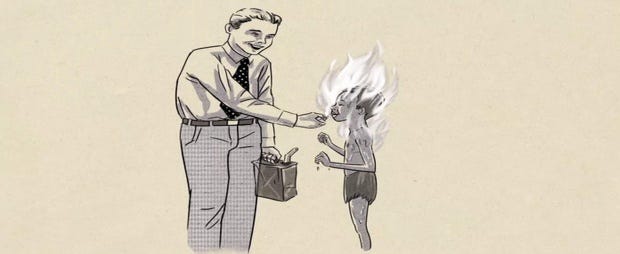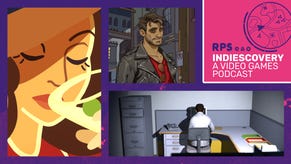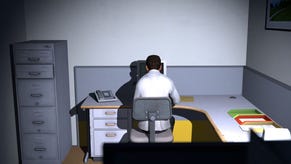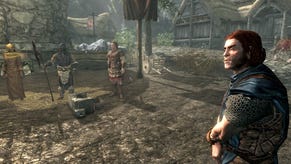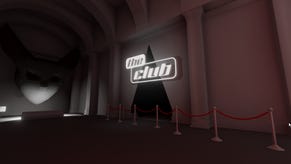Davey Wreden & William Pugh: Life After The Stanley Parable
Interview
Struggling with success is always a hard sell for empathy. It’s all too easy to dismiss such expressions with an easy, “Oh, you poor rich thing.” But it is, of course, far more complicated than that.
Davey Wreden, co-creator of The Stanley Parable, has already written in detail about how phenomenon of his game has personally affected him, in an eloquent blog post last month. Since the release of The Stanley Parable, and its remarkable success, the lives of both of its creators have been turned upside down. At 25 and 20 years old, Davey Wreden and William Pugh, haven’t had an easy time. I spoke with them about their last six months, how the reaction to the game has affected them and their partnership, and how they're dealing with it all. And Pugh's desire to create a rivalry with Steve Gaynor.
It’s lunchtime on the opening Monday of GDC. Wreden and Pugh have already given a talk. A session during the usually quiet period of the event that saw a queue stretching around corridors, then snaking its way back and forth across a huge atrium, so large the 25 minute lecture started ten minutes late. These guys are undoubtedly celebrities in the world of gaming.
I meet with them sat on the wall outside of the overpriced teashop that sits above GDC’s North hall. Wreden is immediately disarming, without any airs, casually cool in a way I could never dream of, his chipped pink and purple nail varnish somehow appearing not even slightly ostentatious. Pugh’s messy long hair and smart jacket capture the conflict that is someone far too young for so much talent, and both are immediately hugely friendly, as we jabber away about Rule 34 within moments of talking. There is, we conclude, already a lot of Narrator slash.
Are they able to comprehend this yet, I ask. To understand that The Stanley Parable is a cultural significance? “It's slowly sinking in,” says Wreden. “Being here, giving our talk and so many people having something they want to say about it, or talk about it. It's very gradually, over time, starting to become more and more real about what that is.” He doubts he’ll ever entirely get his head around it, however. “I think I have to disengage from it at a certain point to stay sane because I'm trying to be a human being with actual emotions, and the more invested you get in that, the more you lose a sense of your own appreciation of the thing.”
William Pugh is the lesser known half of Galactic Café. Wreden created the original Stanley Parable before Pugh was involved, and has continued to be the face of the project ever since. But Pugh, a Yorkshire lad just 19 when he was making the game, is responsible for so much of what makes it so special – he’s the one who made the levels. I can’t help but wonder if he’s envious or grateful for the relative lack of attention that’s fallen on him since the game’s release.
“It’s lovely because I don't have to take it as seriously as he does,” Pugh says. “People don't know who I am. It's wonderful.”
I’m not sure I believe him. His words don’t quite ring true. I’m not sure that with so much acclaim going to Wreden that it seemingly broke him, that being anonymous within this can be so easily enjoyed. I push at it, and he adds,
“I guess there's some kind of selfish part of me that's like, do you know who I am? Level design, level design?”
I leave it alone for now. Instead we talk more about how the two of them – one American, one English, five years apart - came to work together.
“I had literally graduated from college three weeks prior to launching [the original] version,” explains Wreden. “I was going to go to Australia to help own and run a video game bar. My plan was, I want to create a pub-style social space for gaming. I bought the tickets, I had already had them for Mana Bar, which is an Australian video-themed cocktail lounge co-owned by Yahtzee, and I went and actually worked there for a year, after the game had come out. But it was like my plans had shifted.” He knew that he wanted to see The Stanley Parable become something bigger.
I’d been tipped off by another developer that I should ask how Pugh got the job. Apparently there was a story there.
“I think I played the game, the original, at about two in the morning,” Pugh began. “Notch tweeted about it, and I thought, ‘that sounds interesting’. I downloaded it, and hours later I’m like, shit! This is really cool! And then I saw on a forum that Davey was like [adopts ludicrous American accent], ‘Hey buddy, I need people...” That is uncanny, I note of his faux-impression, looking at Davey. “Acting talent!” responds Pugh, who had been planning to pursue an acting career before Stanley took over.
Pugh had already had some success with level design. He’d received a Saxxy award for his Team Fortress 2 maps, and reckoned he might be a good fit for Wreden’s project. “He needed someone who did exactly what I did, so I’m like, shit, shit, shit! Yes! I do this! I emailed him, showed him all the stuff I’d done. He asked for an audition piece and I sent him a level.”
“This was all that same night,” adds Davey. “So it was six in the morning.”
“Six in the morning my time,” continues William, in a flowing banter you’d usually expect from a couple, rather than two developers who had remarkably never met before the release of the game. Pugh slept until 1pm, and woke up to an email from Wreden explaining that the work was good, but it was between him and one other guy. Pugh decided to send him another level, prove himself further, and fired it off. “He sent me an email back,” says Pugh, “saying, ‘Wow, yes, it looks really cool. Looking forward to talking to you more about this.’”
By this Davey Wreden had meant, ‘Give me some time to think.’ But what William Pugh’s sleep-deprived mind read was, ‘You’ve got the job!’ He wrote back straight away bursting, “Oh man, thanks! Oh wow, this is neat, it’s going to be great!”. And Davey was too embarrassed to correct him. And as Davey adds, “That’s how The Stanley Parable was born.”
The two worked together via Skype, in the periods when the eight hour time difference overlapped. Never with video, to save bandwidth, but every day for two years. “We talked about every little thing that came up,” explains Wreden. “We would just talk it through and obsess over it to an extent way further than anyone actually was interacting with it...” “Cared,” interjects Pugh. “Or cared, yes, in most cases. It was good. It was fun.”
But then it seemed to stop being fun. Wreden wrote in February in detail about how the attention had overwhelmed him, how he felt he had lost himself in how he was being perceived by others, and had taken himself off the grid for a few months. “What I found really difficult, he explains as I ask about it, “was that it was so much attention being lumped on me personally. It became really difficult to maintain a sense of self where so many other people are defining you for you. Everyone loves to be liked by someone else because it's like, oh, great, you like me. That makes me feel good, but it's a different thing when 100,000 people are doing that.”
Inside this, Wreden became lost. “What more tends to happen is that you actually forget why you cared about what you're doing in the first place, because you displace all of it on to other people. You don't think about that when you meet someone new, that it would be like, wow, if I projected everything on to you that would be really shitty for me.”
Again Pugh interjects with an aloof approach. And again I don’t quite believe him. “I just like meeting people here. I met Grant Kirkhope the other day. He did the music on Banjo, like, childhood music! That for me was the real...” He cuts himself off. “No, the sentence that lies out in front of what I want to say sounds so fucking cheesy, but... that's the real prize for me.”
We all groan. But this rings true for Wreden too. “You come out here to a place like this and you see your friends and the people you really care about and everything else just melts away. You start to actually care about yourself again because you're having a real human interaction rather than theoretical, nebulous interactions with all of these people who are not real. You can't process all of that and then, when I actually sit down with someone I like and I get to see myself in them again, it's really nice. It's really cathartic and grounding.”
We joke around for a bit, planning mock acceptance speeches if they win at the IGF and GDC awards taking place in a couple of nights, with promises from Pugh to insult at least someone. (They went on to win the IGF Audience Award, and Pugh did indeed hold up signs teasing Steve Gaynor). Then somehow we’re planning fistfights between me and Polygon writers in the fountains above the Moscone centre. Eventually we steer back toward the peculiarities of success. I bring up that having a lot of money and attention suddenly arrive can be something that people aren’t prepared for, and it can be difficult to cope with.
“This biggest problem,” says Davey, “is that there’s no real way to talk about it publicly because it doesn't sound like a real problem. It sounds like a made-up problem, but it's clearly not because a lot of people go through it.”
He makes an interesting analogy. It’s like, he suggests, saying to an alcoholic, ‘Oh you poor thing, you get to drink loads of booze.’
“Until you realise that actually, no, there is something very deeply disturbing about why people end up drinking a lot.” Wreden argues that the same scrutiny needs to be applied to people who find themselves stuck in the spotlight. “We have tabloids that are founded on the idea that people thrust into a spotlight do ridiculous shit. So it's a really big, tough thing to parse. We're getting more reference points, there are more people who are going through it now, but still not a lot. Not like a critical mass. I guess certain people are saying, 'Oh, really, that's interesting that several people have gone through this,' but that's not the common perception of it. The common perception of it is still, 'Wooooo, making money!'”
“Look at Steve Gaynor over there,” says Pugh breaking the mood, staring toward the tea shop where the Gone Home creator is chatting to friends. “Just take him down, take him down to pain town, the pain train to town... Sorry, you had your serious point.”
Again, I can’t help feeling like he’s avoiding facing something. Like Davey’s getting too close to something difficult. Davey asks me how it all appears from my perspective, and we chat a bit about creatives, about how creative people tend toward being nuts. This leads to thinking about how triple A development can protect developers from taking such direct hits.
I joke that a publisher might have protected them from having to have all the money and fame. Wreden seems partially taken by the idea, musing, “Yes, like, oh, my publisher person would be responding to all emails I so I wouldn’t be going insane answering 100 emails a day.” And that five or so percent of the profits that would reach you would be keeping you sweet, I add. Wreden becomes more serious again.
“The thing about it is, having gone through it once now, I would honestly give up, probably, some percentage of money coming in to not have to deal with this anymore. But I learned that, we did it, I'm really glad that we did it because now I have all of that information for future stuff. I came out of it, I'm alive, I'm sane. It's like, as long as I knew I would come out of it and be generally okay, I'm happier that we actually did it and were as vulnerable as we were about it, to have pushed myself that far and gone like, 'Okay, now I know that I can go there and come back'. I would rather that than having defended myself to it pre-emptively and not even know whether I'm capable of dealing with it.”
But surely he’s now in a position where he could hire someone to be between him and his emails? Someone to filter for him?
“I’m very optimistic that there are better processes to facilitate a better communication between myself and other people. I don't know yet what that is, but I definitely didn't do it – I did it very poorly, I think on Stanley, by not filtering anything.”
I ask whether he’s talking here about press attention, or more general public attention. And the question seems to pop a cork. He says, with one breath,
“I'm talking press, I'm talking about people coming up to us with business deals and things they want to talk about. I'm talking about technical things that needs to be changed or fixed or solved, personal problems that people are having, bigger technical problems that the game is having. I'm talking about people's responses to the game, fans who want to write about it, people ask me for things all the time, people who want me to answer questions or talk about our process or just give people some advice. People who want to do little pieces of interviews, people who have complaints about the game, people who would like me to go and put something on their website, or could you please upload media or content? All of those things all add up and my process for handling them was very poor because it was, I'll just do all of it. I'll just respond to all of it while I'm already in a shitty state of mind. I don't know what better process there is, but I would… Maybe it is just hire someone. Maybe it is just someone else do it, but I see it a kind of a challenge to myself - can I do it? That's a really difficult thing to have to do, but I also enjoy, I like that I can be so personal with our fans. I like that can be an actual face on that, so is there a way to still be a face and to not go insane? I don't what it is, but I see it as a challenge for future stuff.”
But, I wonder, this egalitarian approach to communication, this desire to give everyone equal time, how does that work when it comes to the dicks? To the bastards?
“It's rough, he continues. “I don't think it will ever go away. There was a point where I broke, basically, on dealing with the bastards. I was trying to respond to every person on a direct response level, then I snapped and it became too much and I went entirely sarcastic. I used humour to cope, basically, and I stopped giving any actual genuine responses. I think I started doing that with other things, other than just shitty emails. I think I started doing that with a lot of other communication as well. The balance that eventually worked out was a kind of middle ground between the two where we would use humour to respond to people, but to try to actually do it in a positive way. There's a guy who emailed us saying that our game was shit and can I please get a refund? He was like, 'This is worth $5 dollars at most.’”
William takes over the story. “And so we sent him three CD keys for our game. He said that it was worth $5, not $15, so we said, 'You can get your money back, but you've got to sell these CD keys for $5 each.’”
Wreden picks up again. “That kind of thing is a good balance for me where we can be creative about it, that's actually kind of a creative challenge. How can I actually respond to this person in a good way? In a way that's not just blowing them off necessarily, but also stay sane and have a good time doing it. It was like, we had to go back and forth between the extremes before finding out, okay, there is an artful middle ground where I can treat you like you're human, I can be kind to you, but I can also keep a level of emotional distance where I feel still healthy.”
Pugh is quick to add that people shouldn’t contact them for refunds. They don’t handle refunds. Don’t ask them for refunds.
The tone is pretty serious now, and I try again to get Pugh’s perspective on this time of their lives. And this time the flippancy is gone from his voice. “I think it's affected me in a different way than it effected Davey,” he says. “Because there's the notion of me not being publicly seen as the development guy, just because that's how it is.”
I realise that he’s not talking to me now, he’s talking to Davey. “While I was working on the game you were turning it around and getting it so... And with that comes a nasty mentality that can creep in where it's like, I'm not getting any credit for my work. There was a period of time where, on news sites, I'd see 'Davey Wreden, creator of the Stanley Parable' and I was like, oh, that's my two years of work down the drain. That's a really negative spiral that you can get into. It is solved by this talking, having conversations.”
“Then we started correcting those, and we...” Wreden adds, but is cut off.
“No, we didn’t,” Pugh says to him. “And I still don’t get any of the credit.” I comment that RPS is just as guilty as anywhere else of this – that we’ve always talked about TSP as Wreden’s game. That’s it’s always so easy to say ‘Ken Levine’s game’, to pick the imagined auteur.
“That came around,” continues Pugh, looking down. “And then there's the whole notion of money and the fact that I'd risen in the ranks of this indie community whilst having met nobody. Having met nobody at all.” And now the truth was coming, and I felt both relieved and awful for having dug for it. He let it all out.
“I know that most people start by going to GDC and working on a game. This is my first GDC, the first proper conference that I went to was after the game was launched. It was just me working until five in the morning every day for six months and then suddenly having no work to do. I've sacrificed education and social stuff and acting opportunities to work on this thing and then the game finishes and you're left like, God, I've got nothing left to do in the day. Your day just becomes like, playing DOTA, or just sat by yourself not sure what to do. Before there was always the assumption that we'll make a company and we'll work together. And then Davey started talking about, yeah, we'll work... yeah, so five years down the line and ten years down the line... I was like, shit, I'm 19, I don't know what I want to be doing six months from now, and then that leads to feeling trapped and, oh God, I want to quit games, I don't want to do anything anymore. I want to go travel the world, then I don't want to do that, I want to do this. I think Mike Bithell said something really helpful in something he wrote about dealing with success. 'Humans are bad at immediate harsh change'. That spoke to me because you've got all this momentum and you're working really hard and then the games comes out, and all that momentum's got to go somewhere, but you are just sat around, strolling through review sites and watching Let’s Plays.”
It seems impossible to ignore his age in all this. He was a teenager when it was all happening, while Wreden was in his mid-20s. That’s a huge difference. “It’s a very big thing,” says Davey. “When we were talking about what's the next five years going to be like? I have a radically different understanding of that and it's really tough to convey that a lot of times.”
After The Stanley Parable came out, there was an expectation between the pair that they would take a short break, then quickly begin working on a new project. But events meant this didn’t happen, and it seems it was perhaps this more than anything that threw William. “We thought we'd be starting to work on stuff like December, ready to get back into the zone of things. Then Davey was going off here and going off there and I was left just like, okay then, so what do I do? Is this a partnership?”
Once again I realise that William’s no longer addressing me, but Davey.
“Am I waiting for you to get... what's my purpose in life now? It's just like the notion of feeling like you're not worth anything, because you made these things, but that wasn't the important thing behind the success, so throw you away.” He’s clapping his hand on his leg, the words coming out awkwardly. “Then I realised that I'd learnt a lot of stuff and I was in a position to maybe find something that I really wanted to make.”
So how did they resolve this? They’re obviously close, William often throwing an arm around Davey’s shoulders, Davey leaning in to the offered hugs. But they’d made various plans during Stanley’s development, and those plans have yet to start.
“There was a point,” says Pugh, “it was around the time of the Game of the Year post Davey made, where I was like, I can't do all this, and I just fucked off the internet and just blocked everything on all my accounts.”
And this I believed. This was in stark contrast to his opening claims of, “It’s lovely because I don't have to take it as serious as he does.” He continued.
“I went off to stay with a friend in London for a while and then I was just chilling out about that and finding time away from staring at a screen all day to find out how I was feeling about all of it. Then we came back and we talked a lot, and, yes, just conversation. Talking's the way to progress through things.”
Davey picks it up, with William interjecting, each talking over the end of the other’s sentence, again talking to each other, not me.
“Expectations are rough. When you think that you know what you're going to do with yourself, you're leaving yourself wide open to be really badly hurt when reality steps in. There was a certain point where I had to let go of my expectations about what we were going to do next. It's easy to start thinking, wouldn't it be nice if we went and did this together or if we go and do this and then you're...”
“And then you’re out of contact for ages and...”
“Yes, and then we don't get to talk and we're not in person seeing each other to actually hear, be around to see how you're feeling...”
“And it’s like, when’s this going to start?”
“What are we actually going to do?”
“And that just builds frustration.”
Wreden gathers the threads. “When I started to see that going on I said, 'Okay, I've got to step back.' Because me being the, I don't know, being older helps. Having more of a sense of the future of things I guess, I had to let go of that and basically go, 'Maybe we're not going to do any of those [plans made during development]. We're going to find something else, but I need to drop the, ‘Hey, we're going to go right off and do something'. We need time to figure out, we both do, right?” “Yes,” William agrees. “We both need space to figure out who we are,” Wreden concludes.
I ask - more because I feel like the therapist encouraging the conversation between the couple than because I don’t know the answer – what was the concrete reason none of their plans have yet to begin. Wreden says to Pugh,
“Because I was moving all around. I was talking to you about it for a while and we were trying to have conversation about it. Then there was a certain point where I realised I wasn't listening to what you were actually saying, and I realised that I was trying to push you too hard. That was the beginning of stepping back and being like, it's more important for you, and for me, for you to have a sense of yourself and who you actually are, than that we have a project that we're going to do. Because the project will happen, that will come up. That's not even a concern, the concern is are you treating yourself well? I realised I wasn't treating you in a way for you to treat yourself well.”
I comment that most people don’t know who they are before they reach their mid 20s, that 18 to 25 is the time that’s done. That so many celebrities get so fucked up because they’re defined by what they do in their teenage years, and aren’t given that space. William says, “I’m kind of thankful that I've not had to step out that much. The occasional appearance is fun, but I don't know. I think. Looking back, it's been a good thing that I wasn't travelling and working on this all of that.”
“Yes,” agrees Davey. “There were points where I treated you as though you were my age and was like, 'Oh William, let's come and do the thing and take it all on,' and then realised that to give you space – I don't mean to paint this as I'm the...
The wise older mentor, I suggest.
“I don’t mean to be that,” he continues, “but just that there were times that I pushed you without actually letting you have the space to do the thing that you felt you needed to do.”
The conclusion is that they’re working “on stuff”, but nothing is going to be announced for a good while. I say I understand, then demand a release date for The Stanley Parable 2. “That is one year after the release of the first one,” deadpans Pugh. So Q4 2015? “Quarter four, 2015,” he confirms. Wreden embellishes the nonsense,
“One year from the release of Stanley Parable, William and I will fight to the death and the winner will launch Stanley Parable 2. Next GDC.” Live on stage, I suggest. And then, really from nowhere, Wreden delivers one final lengthy comment.
“The other thing about launching a game and then moving on to new stuff is that going through something as stressful and weird as launching a game teaches you a lot about what you actually want out of making a game. At that point you're like, 'Oh, I thought that I was making a game for these reasons, but actually I'm making it for these reasons, so I'm going to make new stuff more in accordance with those reasons.’ So I think that to be able to go on and say that this is what I'm going to work on next, it's like, for example, what you said like all of the pressure from other people, it's like if that is something that you are insecure about, people's opinions of you, then that will be super strong in your mind. You'll struggle with that a lot more. Or whatever it is. If you're insecure about money or the tech of what you're doing, or about people's impressions of you, that will become the biggest, most forefront thing in your mind. The way that occurs to me is like, okay, this thing was really stressful and it taught me that I respond to stress in this way, so let me try and make a game. The next time will I respond to that thing better? Let me try and adjust my process to deal with my biggest insecurities in a more healthy way. That's part, for me, of the process of finding a new project, is what's going to allow me to tackle those things in a better way.”
I feel certain that there are many who will still roll their eyes at the notion of struggling with fame and money, but I’m sure others will be open to the idea. If anything, Pugh and Wreden’s story is a parable for other independent developers, unprepared for the suddenness of an overnight success, the switch from anonymous bedroom coding to international acclaim, with no run-up.
Both are extremely likable, extremely talented men, and whatever they do next is certainly going to be worth paying close attention to. The shadow of The Stanley Parable will inevitably loom large above it, but so it goes.
At the end of our interview, William demands hugs. Hugs feel appropriate. There are hugs.
